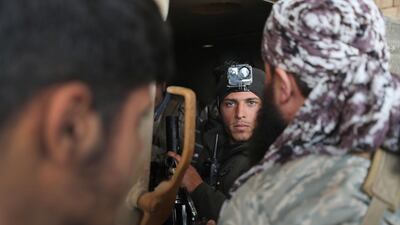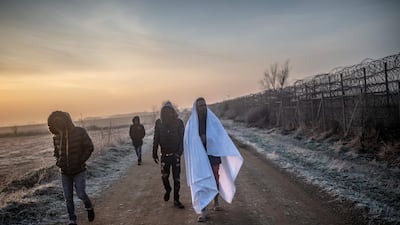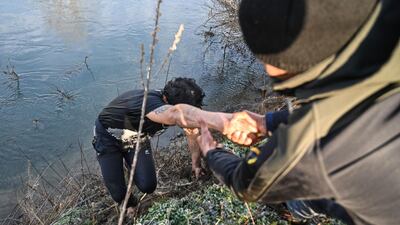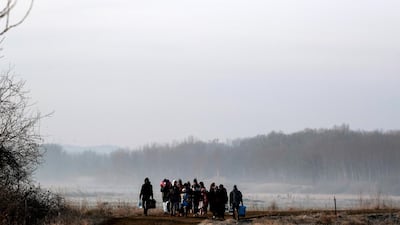Syrian rebels supported by Turkey have launched a counter-offensive against pro-regime forces in Idlib province, opposition sources said on Thursday as a proxy war between Turkey and Russia intensified ahead of a meeting of the leaders of the two countries.
The aim of the offensive around the M5 highway between Damascus and Aleppo is to deny the regime and its Iranian and Russian allies strategic gains with which they hope to crown a two-month-long campaign in northern Syria, the sources said.
Agreements between Moscow and Ankara on how to share the spoils from their interventions in Syria and carve out spheres of influence broke down at the start of this year. A war of words between the two countries has escalated, raising fears of a direct confrontation in Idlib.
Turkish President Recep Tayyip Erdogan said he expects his talks with Russian leader Vladimir Putin in Moscow later on Thursday to result in a ceasefire.
But Turkey kept up the military pressure on the ground, with Syrian opposition sources saying Turkish artillery and rocket launchers in Idlib were bombing loyalist positions in and around the town of Saraqib. Russian planes raided rebel positions in Zawiya Mountain to the south-west.
Saraqib lies at the intersection of the M5 and the M4, a highway between Aleppo and the Mediterranean, and has changed hands several times amid fierce battles.
Opposition activist Ahmad Al Sheikh said the rebel counter-offensive “is major but is not being advertised”. He said although Turkey has sent significant troops and hardware into Idlib, its Syrian allies were doing the fighting.
"Turkish support is injecting new life in the opposition," Mr Al Sheikh told The National from Atmeh on the border with Turkey.
Mr Al Sheikh said the Saraqib offensive was being kept low key, possibly to avoid raising tensions ahead of Mr Erdogan's meeting with Mr Putin.
The town has become a focal point of the contest in Idlib. But even if the regime and its Iranian-backed allies hold on to the city, they face a Turkish-backed war of attrition that could undermine the military superiority they had enjoyed, mainly because of Russian air support.
Beneficiaries of Turkey's renewed support range from the Syrian National Army, Ankara's proxy that until now was primarily used against a Syrian Kurdish militia; the Al Qaeda-linked Hayat Tahrir Al Sham; and units of the Free Syrian Army, which had almost become defunct.
The Turkish-backed push on Saraqib is taking place despite Moscow's announcement this week that Russian military police were sent to the city, the sources said.
Most of Idlib falls under one of the “de-escalation” zones in Syria designated under the 2017 Astana agreement supervised by Moscow. Most of these zones have since been overrun by regional Shiite militias allied to the Syrian regime, with the help Russian air strikes.
An intensified Russian air campaign in Idlib gave regime forces access to the M5 and M4, which run through the east and south of the province respectively.
But the regime has not been able to translate its territorial gains into control over the two highways because of Turkey's entry into the battlefield with drones, artillery and missiles, and its support for rebel hit-and-run attacks, the sources said, pointing to the downing of at least two regime planes.
The Syrian Network for Human Rights said Russian and regime air strikes killed at least 300 civilians in January. The air campaign has pushed much of Idlib’s 3 million population into a narrowing strip of territory along the border with Turkey.
Moscow says it only targets what it describes as terrorists.
Turkey says it cannot afford another influx of Syrian refugees and that Russia and western countries must realise its need to maintain a de facto buffer zone in Idlib and northern Aleppo as a safe haven for Syrians displaced by regime attacks on rebel areas.
Lack of European support for Turkey’s position prompted Mr Erdogan last month to allow some of the millions of Syrian refugees hosted by his country to cross into Europe, thrusting Syria's conflict back to the top of foreign policy concerns for decision-makers on the continent.
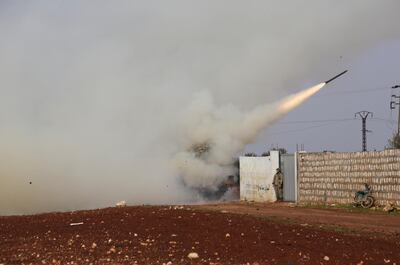
After the first wave of refugees into Europe in 2015, European powers, as well as the US, ceded management of the Syrian conflict to Russia and Turkey.
Othman Abdulqader, another opposition activist in Idlib, said that although Turkey’s declared intention is to push the Syrian regime away from the displaced civilians massed near its border, it had sacrificed its Syrian allies before in deals with Moscow.
“Hezbollah and the other Shiite militias are fighting fiercely on behalf of the regime to control the highways. The Turkish support would need to be sustained,” Mr Abdulqader said.
“Otherwise we are being played with again.”
